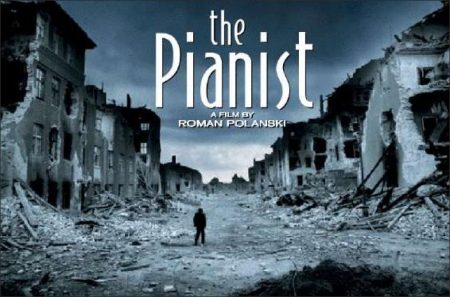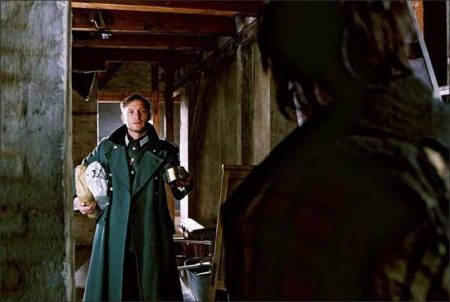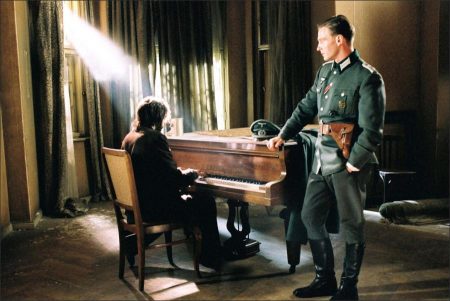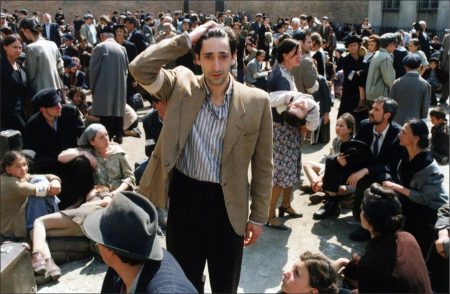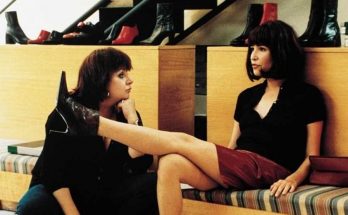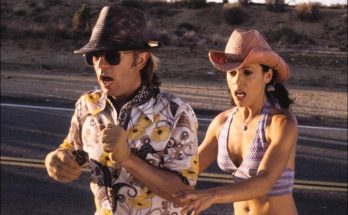Taglines: Music was his passion. Survival was his masterpiece.
The Pianist movie storyline. An adaptation based on the autobiography of the acclaimed Polish composer, Wladyslaw Szpilman, who detailed his survival during World War II, and narrowly escaped a roundup that sent his family to a death camp. A composer and pianist, Szpilman played the last live music heard over Polish radio airwaves before Nazi artillery hit. There, in Poland, Szpilman struggled to stay alive–even when cast away from those he loved. He spent the duration of the war hiding in the ruins of Warsaw and scavenging for food and shelter. Szpilman eventually reclaimed his artistic gifts, and confronted his fears–with aid from the unlikeliest of sources.
The Pianist is a 2002 biographical drama film co-produced and directed by Roman Polanski, scripted by Ronald Harwood, and starring Adrien Brody. It is based on the autobiographical book The Pianist, a World War II memoir by the Polish-Jewish pianist and composer Władysław Szpilman. The film was a co-production between France, the United Kingdom, Germany, and Poland.
The Pianist met with significant critical praise and received multiple awards and nominations. It was awarded the Palme d’Or at the 2002 Cannes Film Festival. At the 75th Academy Awards, The Pianist won Oscars for Best Director (Roman Polanski), Best Adapted Screenplay (Ronald Harwood), and Best Actor (Adrien Brody), and was also nominated for four other awards, including the Academy Award for Best Picture. It also won the BAFTA Award for Best Film and BAFTA Award for Best Direction in 2003 and seven French Césars including Best Picture, Best Director, and Best Actor for Brody. It was included in BBC’s 100 Greatest Films of the 21st Century.
The story had deep connections with director Roman Polanski because he escaped from the Kraków Ghetto as a child after the death of his mother. He ended up living in a Polish farmer’s barn until the war’s end. His father almost died in the camps, but they reunited after the end of World War II.
Joseph Fiennes was Polanski’s first choice for the lead role, but he turned it down due to a previous commitment to a theatrical role.[8] Over 1,400 actors auditioned for the role of Szpilman at a casting call in London. Unsatisfied with all who tried, Polanski sought to cast Adrien Brody, whom he saw as ideal for the role during their first meeting in Paris.
Principal photography on The Pianist began on 9 February 2001 in Babelsberg Studio in Potsdam, Germany. The Warsaw Ghetto and the surrounding city were recreated on the backlot of Babelsberg Studio as they would have looked during the war. Old Soviet Army barracks were used to create the ruined city, as they were going to be destroyed anyway.
The first scenes of the film were shot at the old army barracks. Soon after, the film crew moved to a villa in Potsdam, which served as the house where Szpilman meets Hosenfeld. On 2 March 2001, filming then moved to an abandoned Soviet military hospital in Beelitz, Germany. The scenes that featured German soldiers destroying a Warsaw hospital with flamethrowers were filmed here. On 15 March, filming finally moved to Babelsberg Studios. The first scene shot at the studio was the complex and technically demanding scene in which Szpilman witnesses the ghetto uprising.
Filming at the studios ended on 26 March and moved to Warsaw on 29 March. The rundown district of Praga was chosen for filming because of its abundance of original buildings. The art department built onto these original buildings, re-creating World War II–era Poland with signs and posters from the period.
Additional filming also took place around Warsaw. The Umschlagplatz scene where Szpilman, his family and hundreds of other Jews wait to be taken to the extermination camps was filmed at the National Defence University of Warsaw. Principal photography ended in July 2001 and was followed by months of post-production in Paris.
The Pianist (2003)
Directed by: Roman Polanski
Starring: Adrien Brody, Thomas Kretschmann, Frank Finlay, Maureen Lipman, Emilia Fox, Michał Żebrowski, Jessica Kate Meyer, Julia Rayner, Richard Ridings
Screenplay by: Ronald Harwood
Production Design by: Allan Starski
Cinematography by: Paweł Edelman
Film Editing by: Hervé de Luze
Costume Design by: Anna B. Sheppard
Set Decoration by: Wieslawa Chojkowska, Gabriele Wolff
Art Direction by: Nenad Pecur
Music by: Focus Features
MPAA Rating: R for violence and brief strong language.
Distributed by: Focus Features
Release Date: September 6, 2002 (Poland), March 6, 2003 (United Kingdom), March 8, 2003 (United States)
Views: 205
